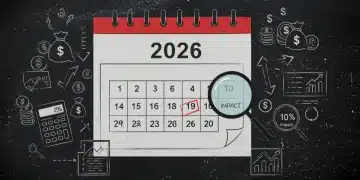Tax Planning 2025: Minimize Your Tax Liability with These Strategies

Tax Planning for 2025: Key Changes and Strategies to Minimize Your Liability involves understanding new tax laws, optimizing deductions, and making strategic financial decisions to reduce your overall tax obligations.
Navigating the complexities of tax law can feel overwhelming. However, proactive tax planning for 2025: key changes and strategies to minimize your liability can significantly reduce your financial burden and optimize your financial health.
Understanding the 2024 Tax Landscape
The tax landscape is constantly evolving, and understanding the rules currently in place going into 2025 is crucial before diving into the future. These laws affect how much you owe and the decisions you make regarding investments, deductions, and credits.
Key Tax Provisions to Know
Many provisions in place now are expected to remain relevant. Knowing them will give you a more sure footing when planning for 2025.
- Standard Deduction Amounts: Keep abreast of the standard deduction amounts for different filing statuses, as they are adjusted annually for inflation. This is the deduction you can take if you don’t itemize.
- Tax Brackets and Rates: The income thresholds for each tax bracket can also change yearly. Knowing your tax bracket helps you estimate your tax liability accurately.
- Tax Credits: Tax credits, like the Child Tax Credit or Earned Income Tax Credit, can reduce your tax liability dollar-for-dollar. Check if you qualify for any applicable credits.
Staying updated about these provisions and how they affect your situation is paramount to effective tax planning.
Anticipating Tax Law Changes in 2025
Looking ahead, there’s potential for new tax legislation. Knowing where the political winds are blowing can help you make more informed assumptions.

Potential Policy Shifts
Pay attention to proposed policy changes that could change the tax system in 2025. Tax law can change anytime there’s a sufficient shift in Congress or the White House.
- The Tax Cuts and Jobs Act (TCJA) Expiration: Many provisions of the TCJA are slated to expire at the end of 2025. Keep in mind that these changes could impact individual tax rates, deductions, and credits.
- Proposed Legislation: Monitor the progress of any new tax legislation introduced in Congress. Pay attention to the details of proposed changes and assess their potential impact on your tax situation.
Staying proactive about policy changes empowers you to make informed financial decisions and adjust your tax strategies as needed.
Strategies for Maximizing Deductions
Deductions directly reduce your taxable income, resulting in lower tax liability. By strategically maximizing deductions, you can achieve significant tax savings.
Itemizing Deductions vs. Standard Deduction
Most taxpayers elect to take the standard deduction, but itemizing may offer more favorable tax outcomes in some situations. Take the time to determine your optimal course of action.
If your total allowable itemized deductions exceed the standard deduction amounts for your filing status, you may benefit from itemizing. Common itemized deductions include:
- Medical Expenses: You can deduct medical expenses exceeding 7.5% of your adjusted gross income (AGI).
- State and Local Taxes (SALT): You can deduct state and local taxes up to a limit of $10,000 per household.
- Home Mortgage Interest: You can deduct interest paid on mortgage debt up to certain limits.
Keep accurate records of all potential itemized deductions throughout the year.
Tax-Advantaged Investments
Investing in tax-advantaged accounts helps you minimize your current tax liability and provides powerful tax-saving opportunities in the long term.

Retirement Savings Accounts
Tax-advantaged retirement accounts offer various tax benefits, such as tax-deferred growth or tax-free withdrawals.
Here are examples of popular retirement savings accounts:
- 401(k) Plans: Contribute to a 401(k) plan through your employer and defer paying taxes on your contributions and earnings until retirement
- Traditional IRAs: Contributions to a traditional IRA may be tax-deductible, and earnings grow tax-deferred.
- Roth IRAs: Contributions to a Roth IRA are not tax-deductible, but qualified withdrawals in retirement are tax-free.
Consider consulting with a financial advisor to determine the best retirement savings strategy for your goals.
The Role of Professional Tax Advice
Navigating the complexities of tax planning can be challenging, especially with constantly changing tax laws and regulations. Seeking professional tax advice can provide personalized guidance and peace of mind.
When to Consult a Tax Professional
You may consider consulting a tax professional in the following situations:
- Significant Life Events: Experiencing major life events such as marriage, divorce, or the birth of a child can have tax implications.
- Complex Financial Situations: If you have complex financial situations such as self-employment income, rental properties, or significant investments, a tax professional can help you navigate the complexities of tax planning.
Ultimately, the decision to seek professional tax advice is something to be considered on a case by case basis. If you feel like you’re in over your head, advice can be valuable.
Year-End Tax Planning Tips
As the end of the tax year approaches, it’s essential to take proactive steps to finalize your tax planning for the year.
Making Smart Financial Decisions
By taking proactive steps during the last few months of the year, you can make financial decisions that may have tax consequences.
Consider:
- Tax loss harvesting: offsetting capital gains with investment losses to reduce your overall tax liability.
- Accelerating deductions: paying deductible expenses before year-end to maximize deductions.
| Key Point | Brief Description |
|---|---|
| 💡 Understand New Tax Laws | Stay informed about changes in tax legislation for effective planning. |
| 💰 Maximize Deductions | Optimize itemized & standard deductions to minimize taxable income. |
| 📈 Invest Tax-Advantaged | Utilize 401(k)s, IRAs, & other accounts for tax-efficient growth. |
| 🤝 Seek Professional Advice | Consult experts for tailored guidance and to navigate complex tax scenarios. |
Frequently Asked Questions
▼
The standard deduction for 2024 varies based on filing status – for example, it’s higher for those who are married filing jointly versus single filers. These amounts are typically adjusted annually for inflation.
▼
Maximize deductions by keeping detailed records of eligible expenses, such as medical costs, charitable donations, and home office expenses. Consider itemizing if your deductions exceed the standard deduction.
▼
Tax-advantaged investments include 401(k)s, Traditional IRAs, and Roth IRAs. These accounts offer tax benefits such as tax-deferred growth or tax-free withdrawals, and can significantly reduce your tax burden.
▼
Consider consulting a tax professional if you experience major life events, have complex financial situations, or simply prefer expert guidance in navigating your tax obligations and opportunities.
▼
Tax loss harvesting involves selling investments at a loss to offset capital gains, thereby reducing your overall tax liability. It’s a strategy best employed with careful planning.
Conclusion
Effective tax planning for 2025: key changes and strategies to minimize your liability requires staying informed, understanding your options, and making strategic financial decisions. By proactively planning and seeking expert advice when needed, you can optimize your tax outcomes and achieve long-term financial success.





